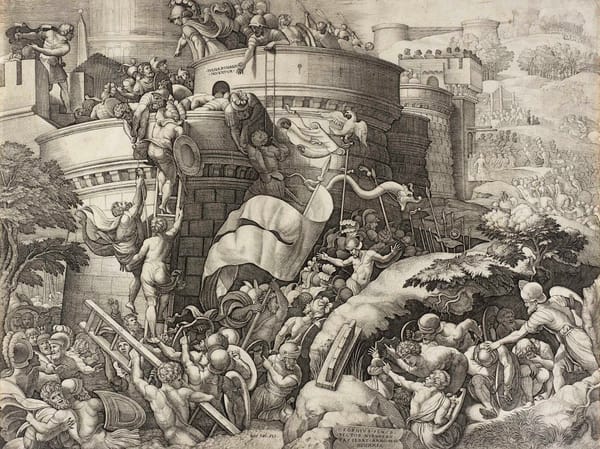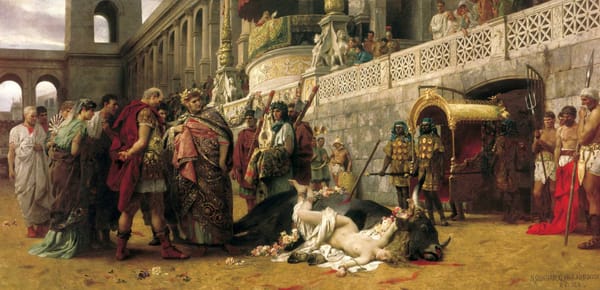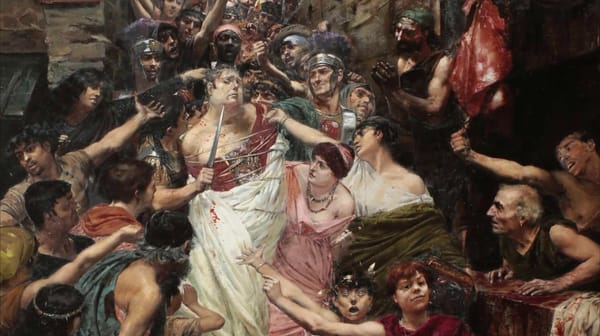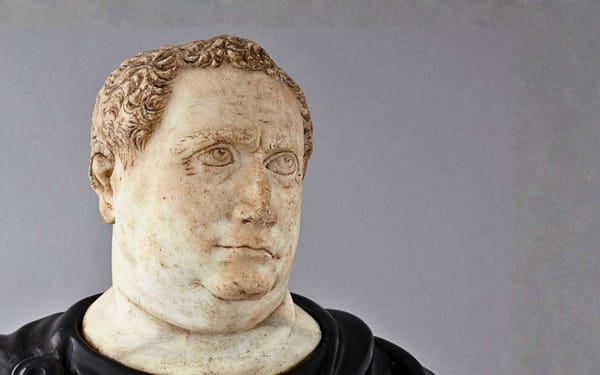The Stoic Emperor: How Marcus Aurelius Outwitted Death in the Germanic Wilds
In the treacherous Germanic frontier, Emperor Marcus Aurelius faced assassination by tribal chieftains. Yet, with Stoic wisdom and a loyal centurion's aid, he transformed a deadly feast into a legendary tale of diplomacy and courage.

Disclaimer
This story is based on historical figures, but is ultimately a work of fiction. We're a small team of human writers, fascinated with Ancient Rome and its myriad myths and legends. Narrating fantastical stories to each other started as a hobby; and with the help of AI tools, we are able to share our passion with the rest of the world. We wholeheartedly wish you enjoy our craft – Carpe diem.
The Barbarian Frontier
The vast expanse of the Germanic frontier, a land of dense forests and treacherous rivers, was a constant challenge for the Roman Empire. It was here that Emperor Marcus Aurelius found himself, leading his legions against the barbarian tribes that threatened the empire's northern borders.
Marcus, unlike many of his predecessors, was not just a warrior-emperor but also a philosopher. His writings, now known as the "Meditations," were a testament to his deep understanding of Stoicism, a philosophy that emphasized rationality, discipline, and acceptance of one's fate.
The Germanic Intrigue
The Germanic frontier was a land of shifting alliances and intricate power dynamics. While the tribes were often at odds with each other, the presence of the Roman legions provided a common adversary around which they could rally. It was in this complex web of politics and ambition that the plot to assassinate Marcus Aurelius was hatched.
Deep within the dense forests of Germania, away from prying Roman eyes, a secret council of Germanic chieftains convened. These were leaders of the most influential tribes, each with their own grievances against the Roman Empire. The council was the brainchild of Wulfgar, a chieftain known for his cunning and ambition.
Wulfgar's plan was simple yet audacious. He proposed a grand feast, a gesture of peace towards the Romans. The idea was to lure Marcus Aurelius into a false sense of security and then strike when he least expected it.
The Bait
To make the invitation more enticing, Wulfgar used a Roman deserter named Cassius. Cassius, disillusioned with the empire and seeking refuge among the Germanic tribes, was the perfect pawn. He carried with him tales of Roman excesses, of villages razed, and of the empire's insatiable hunger for expansion.
Cassius was presented to Marcus as a peace envoy, bearing gifts and a message of reconciliation from the Germanic tribes. He spoke of their desire for peace, of the mutual benefits of trade and cooperation, and of the grand feast that awaited the emperor.
Marcus, ever the diplomat, saw this as an opportunity to strengthen Rome's position in Germania. He accepted the invitation, unaware of the trap that was being laid for him.
The Deception
As Marcus and his entourage made their way to the feast, they were led through a series of winding paths, designed to disorient and isolate them.
The Germanic tribes, using their intimate knowledge of the terrain, had chosen a location that was both remote and strategically advantageous. The feast was held in a grand hall, adorned with intricate carvings and tapestries that told the tales of Germanic legends. The Romans, impressed by the display of wealth and culture, were lulled into a false sense of security.
Throughout the night, as the wine flowed and the music played, the Germanic warriors, disguised as servers and entertainers, positioned themselves around the hall. The stage was set for the assassination.





About the Roman Empire Times
See all the latest news for the Roman Empire, ancient Roman historical facts, anecdotes from Roman Times and stories from the Empire at romanempiretimes.com. Contact our newsroom to report an update or send your story, photos and videos. Follow RET on Google News, Flipboard and subscribe here to our daily email.
Follow the Roman Empire Times on social media: